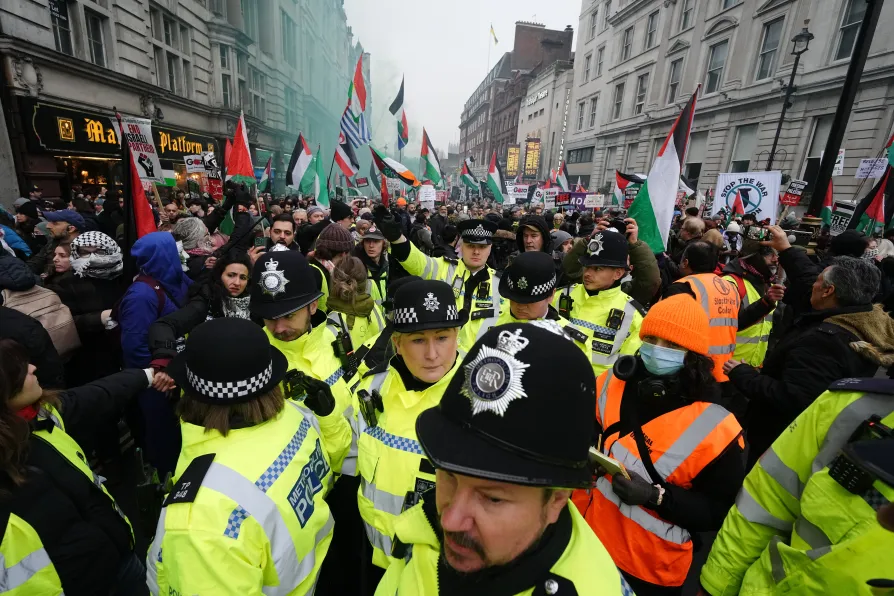The newly elected general secretary of the Aslef train drivers’ union speaks to Ben Chacko about union wins, a welcome shift in approach to the rail sector and what still needs to be done
From Gaza protest bans to proscribing Palestine Action, political elites are showing a crisis of confidence as they abandon Roy Jenkins’s apologetic approach for Suella Braverman’s aggressive ‘hate march’ rhetoric, writes PAUL DONOVAN

 People taking part in a national march for Palestine on Whitehall in central London, January 18, 2025
People taking part in a national march for Palestine on Whitehall in central London, January 18, 2025
CIVIL LIBERTIES are under attack in Britain in a way that has never been seen in modern times. There is always a tension between citizens’ liberties and those who govern, going back through the centuries.
These ancient rights, like free speech, right of assembly and trial by jury, go hand in hand with the functioning of a healthy democracy. As democracy falters, those in power feel insecure and feel the need to clamp down.
A former chief constable said that the mantra, “give me your liberties and I will provide security,” has been the refrain of dictators down the ages. It is a threat that is never far away.
In modern times, the conflict in the north of Ireland provided ample proof of liberties being removed on the back of security. Then, Home Secretary Roy Jenkins first introduced the Prevention of Terrorism Act in the wake of IRA bombings in England.
He introduced the measure in 1974, which allowed for seven days’ detention by the police, apologetically, declaring it a “temporary” and “draconian” measure. The PTA also allowed for proscribing (banning) terror organisations. There was a debate for renewal each year thereafter.
Judge-only Diplock Courts came in in the north of Ireland, where the right to silence was first removed. Restrictions on assembly took place. The PTA was then effectively used to harass the Irish community throughout Britain. Later, anti-terror legislation was used in similar fashion, against the Muslim community, during the so-called war on terror.
The scope of anti-terror laws has extended over the years. A circular process was also developed that saw rights removed under anti-terror law downloaded into the criminal law. The detention period under the PTA extended to 14, then 28 days.
Then Labour prime minister Tony Blair tried to get pre-charge detention extended to 90 days. But this was famously defeated in a back-bench MP rebellion caused by a revolt in civil society. The threat to civil liberties, though, continued over these years.
The creation of the control order regime, overseen through immigration courts, effectively at one point legitimised detention without trial for terror suspects. Individuals were effectively kept in detention, often not knowing what they were accused of. The ongoing erosion of civil liberties continued, with every atrocity being used as a reason to cut more liberties in the name of security.
Come forward to the present day. Peaceful marches through London protesting about what has been going on in Gaza are vilified by successive home secretaries. None of Jenkins’s reticence, over restricting liberties, from his successor, Suella Braverman, who in 2023 branded the protests in London to be “hate marches.”
The protests have been peaceful. The police have been put under pressure to meet right-wing politicians’ constructs that they are not. Braverman accused them of bias. The police have been on a tightrope, which they have struggled to maintain. Freedom of speech and protest is under pressure.
However, what the politicians would do well to heed is that when people have a justice-based grievance, just making it more difficult to protest does not make the issue go away. It simply changes the form of protest.
Returning to the north of Ireland, where it was the initial failure to respond to the demands of the civil rights protesters, that in part led to the violent conflict that followed. People’s grievances found other forms, fuelled by a denial to respond to their demands, then a clampdown on their means to make those demands.
Today, politicians who seek to demonise protest and restrict freedom of speech should learn the lessons of history. A strong, thriving democracy is one at ease with itself. Liberties, such as free speech, habeas corpus and right of assembly, abound and are celebrated.
They should not be removed on a whim. Confident leaders are comfortable and proud of these liberal, pluralist traditions. As the chief constable said, it is the dictators who promise security in exchange for liberties. We cannot sleepwalk down that path.

ANSELM ELDERGILL examines the government’s proposals to further limit the right of citizens to trial by jury

As Trump targets universities while Homeland Security chief Kristi Noem redefines habeas corpus as presidential deportation power, STEPHEN ARNELL traces how John Scopes’s optimism about academic freedom’s triumph now seems tragically premature

Court of Appeal rules key anti-protest legislation was forced through unlawfully










